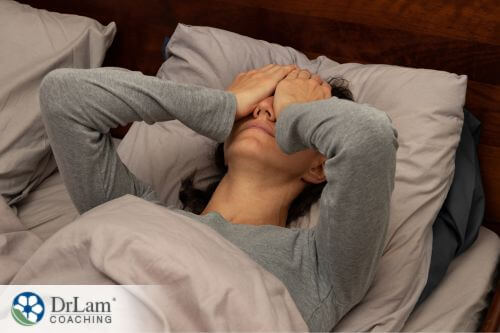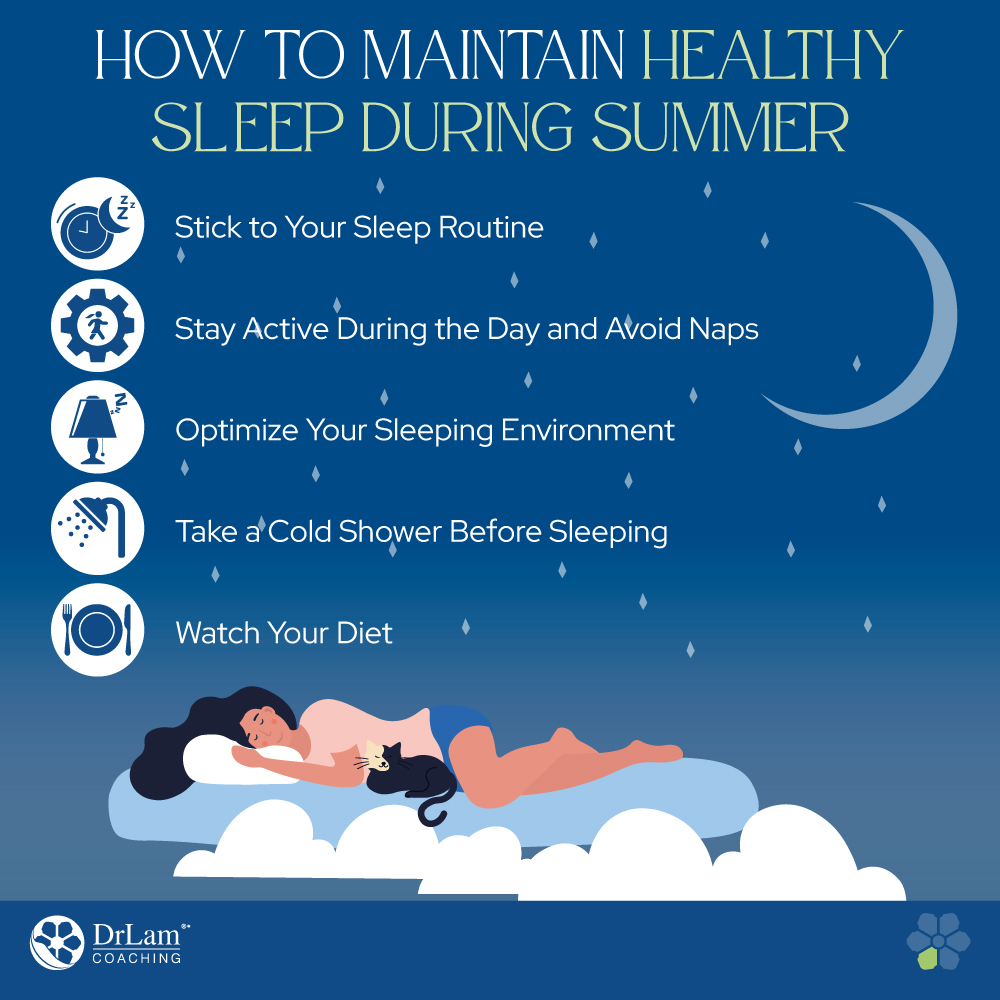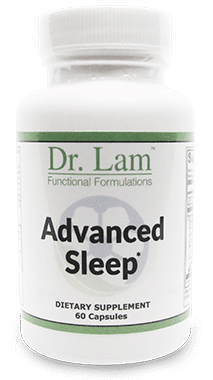 In the minds of many, summer is easily the best season, and it’s not really hard to see why. When you think of summer, you think of sunny skies, warm weather, vacations, beach parties, and the like. What many people do not think of is sleep health, and you may be wondering why that is even important. Well, evidence suggests an adverse effect on sleep health during summer. Is there any relationship between the two, though? More importantly, if a relationship exists, how can you maintain healthy sleep during the long summer days? Let’s find out.
In the minds of many, summer is easily the best season, and it’s not really hard to see why. When you think of summer, you think of sunny skies, warm weather, vacations, beach parties, and the like. What many people do not think of is sleep health, and you may be wondering why that is even important. Well, evidence suggests an adverse effect on sleep health during summer. Is there any relationship between the two, though? More importantly, if a relationship exists, how can you maintain healthy sleep during the long summer days? Let’s find out.
Summer is a great season – that much is unarguable. It is just a great time to take a well-deserved break and enjoy the outdoors. However, amid all of the merriness and goodness summer brings, there is evidence it can worsen sleep quality.
According to one study, sleep duration is shorter in summer than in winter by up to 11 minutes, with older studies showing a difference in duration of up to 36 minutes.1 While an 11-minute difference may not seem like that much, it eventually starts to add up, and you may be losing around six hours of sleep in a month. When the difference is closer to 36 minutes, as earlier studies indicated, that’s around 17 hours of sleep lost over a month. When you factor in the three months summer lasts, the total sleep time lost becomes significant.
According to the study, the exact time lost between summer and colder seasons varies, depending on age, sex, and residential area. Younger individuals and women are more prone to losing more sleep during summer, while those who live in areas with longer days lose more sleep than others.
Although sleep health is not entirely reliant on sleep duration, this parameter is a valuable metric when assessing sleep quality. Everyone has a few nights where they lose some valuable sleep, but the fact that the loss becomes consistent over a relatively long time in summer makes it significant to sleep health. Also, the more time is lost during sleep, the higher the risk of napping during the day, which then corresponds to even more sleep lost at night. This marks the beginning of a vicious cycle that may result in impaired sleep health and its attendant problems.
One in three adults in the US does not get enough sleep. Multiple factors contribute to poor sleep quality, and an understanding of how these factors interact with sleep is essential to improving sleep health. Since summer is a culprit in poor sleep quality, it is important to examine why and how it affects sleep.
During summer, the amount of sunlight we are exposed to increases. This results in longer days, peaking during the summer solstice, especially in areas closer to the northern latitudes. The extra sunlight during summer adversely affects sleep health due to its suppression of melatonin.2
 Under normal conditions, light is the driving synchronizing factor of the body’s biological clock. Melatonin, often called the sleep hormone, gradually increases during the day, reaching its peak during the darkness in the evening. Since summer has longer days, it takes longer for melatonin to reach its peak and elicit its effects, corresponding to shorter sleep.
Under normal conditions, light is the driving synchronizing factor of the body’s biological clock. Melatonin, often called the sleep hormone, gradually increases during the day, reaching its peak during the darkness in the evening. Since summer has longer days, it takes longer for melatonin to reach its peak and elicit its effects, corresponding to shorter sleep.
Aside from taking longer to fall asleep, light exposure in the later hours of the day may also interfere with sleep quality, as you may wake more frequently while sleeping. The more interruptions during sleep, the lesser the chances of the sleep being refreshing, and the worse the sleep health becomes over time.
For most people, this is the best feature of summer. It’s a stark contrast to the colder, harsher weather in other seasons, especially winter. However, this warm weather is not the best for sleep, as the body naturally cools in the evenings in preparation for sleep. Aside from the temperature drop before sleep, the body’s temperature also drops steadily during sleep, allowing us to achieve deep, restorative sleep.
At higher ambient temperatures, as is the case during summer, the body finds it more difficult to enter slow-wave sleep, which is the restorative portion of sleep. Also, there is a higher risk of waking during the night, leading to the body losing more valuable sleep time. In fact, studies show that we have lost about 44 hours of sleep annually since the turn of the century due to increasing temperatures. And, if current trends are anything to go by, we could lose up to 58 hours of sleep by the end of the century.3
The warmer, milder summer weather often leads to more vacations, travels, parties, and outdoor visits. This often translates into a higher consumption of sugary and alcoholic foods and beverages. With travel, there is the direct risk of jet lag, which messes up the circadian rhythm and affects the sleep-wake cycle. All of this socializing may make it more difficult to fall and stay asleep.
Adrenal Fatigue Syndrome (AFS) is the non-Addison’s form of adrenal dysfunction, where the body’s stress response cannot cope with chronic life stressors. The body has a stress response system that is quite adept at managing stress, known as the NeuroEndoMetabolic (NEM) Stress Response. This system comprises six circuits, spanning different organs and systems. Chronic stress can cause this system to dysregulate, leading to AFS and dysregulation throughout the body. This can put stress on the neuroaffect circuit of the NEM, bringing with it symptoms like insomnia, anxiety, and depression, which further interfere with sleep health.
Also, people with AFS or under chronic stress have elevated levels of cortisol, the stress hormone. During the nighttime, cortisol production is expected to be low to allow the body to enter its sleep cycle. However, the high cortisol levels impact the duration and quality of sleep.

Although many of the factors that cause poor sleep health during summer are out of our control, it is still possible to maintain good sleep quality during summer. Below are a few tips.
A sleep routine is essential to maintaining good sleep hygiene and improving sleep quality. Having certain relaxation activities you do before your bedtime allows your body to associate these activities with sleep, eventually getting used to it. Creating a sleep routine is often not difficult for people during summer; sticking to it is the issue. However, for all the benefits that come from getting enough sleep, you need to discipline yourself to stick to the routine, even during summer. Ideally, try to go to sleep and wake at the same time every day, even on weekends.
 Being active during summer days seems like a given, but many resort to napping during the day to regain their energy. However, naps during the day make it more difficult to fall asleep at night. On the other hand, increasing your daytime activity ensures you are tired enough at night to not have any trouble falling and staying asleep.
Being active during summer days seems like a given, but many resort to napping during the day to regain their energy. However, naps during the day make it more difficult to fall asleep at night. On the other hand, increasing your daytime activity ensures you are tired enough at night to not have any trouble falling and staying asleep.
Your sleeping environment is as important as any other factor to your sleep health. You should aim to have a cool and dimly lit room for optimal sleep. The lower the external stimuli you are exposed to before sleeping, the higher the chances of sleeping well at night. Since summer has a higher ambient temperature, you must be more intentional about keeping your room and its environment cool.
Body temperature starts to fall about two hours before sleeping, and it continues to fall throughout the night. It is more difficult to maintain a cooler body temperature during summer because room temperature is generally much higher than in other seasons. Therefore, a cold shower can help the body reduce its internal temperature and set the mood for a relaxing and refreshing sleep. However, for this to be effective, you need to remain in a cool environment after showering.
What you eat and drink can significantly affect your sleep health. This is more consequential during summer as the risk of indulging in overly sweet foods and alcoholic beverages is higher. However, while you do not necessarily have to cut out these foods and beverages, ensure you take them earlier in the day and in moderation. As a rule of thumb, do not drink alcohol or eat heavy meals three hours before your bedtime.
Sleep supplements have advantages for helping build and maintain good sleep health. As with other supplements, the important things to consider when choosing a supplement are the ingredients in the supplement and the manufacturer's reputation.
For a sleep supplement to be effective, it needs ingredients that promote and maintain sleep. Some of the best include:
Two of the best supplements you can get on the market containing these ingredients and from a reputable source are Adrenal Sleep and Adrenal Stay Asleep by Dr. Lam®. However, ensure you speak to your healthcare provider before using any sleep supplements.
Sleep health is absolutely crucial to healthy living. Multiple factors affect sleep health, and seasonality is one of them. Studies reveal that it is more difficult to fall and stay asleep in the summer for multiple reasons, including extra sunlight, warmer weather, and increased social activity. Still, with the right approach, centered around maintaining a good sleep routine, optimizing the sleep environment, monitoring diet and supplements, and reducing naps, it is possible to maintain sleep health even amidst summer activity.

Boost Your Sleep Health Today!
Suzuki M, Taniguchi T, Furihata R, Yoshita K, Arai Y, et al. (2019) Seasonal changes in sleep duration and sleep problems: A prospective study in Japanese community residents. PLOS ONE 14(4): e0215345. https://doi.org/10.1371/journal.pone.0215345
Lucia Helena Souza de Toledo, Maria Nathália Moraes, Maristela de Oliveira Poletini, José Cipolla Neto, Jerome Baron, Theo Mota, Modeling the influence of nighttime light on melatonin suppression in humans: Milestones and perspectives, Journal of Photochemistry and Photobiology, Volume 16, 2023, 100199, ISSN 2666-4690, https://doi.org/10.1016/j.jpap.2023.100199.
Minor K, Bjerre-Nielsen A, Jonasdottir SS, Lehmann S, Obradovich N. Rising temperatures erode human sleep globally. One Earth. 2022;5(5):534-549. doi:10.1016/j.oneear.2022.04.008
Where you live determines the exact amount of sunlight you are exposed to, and therefore impacts sleep health. Areas closer to the northern hemisphere are exposed to more sunlight during the day, which can impact the duration of their sleep.